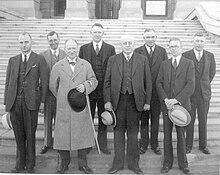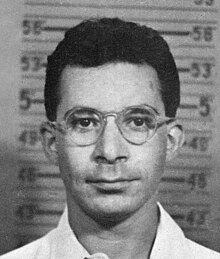Portal:Canada
| Showcase | Contents | Contributing |
Introduction
Canada is a country in North America. Its ten provinces and three territories extend from the Atlantic Ocean to the Pacific Ocean and northward into the Arctic Ocean, making it the world's second-largest country by total area, with the world's longest coastline. Its border with the United States is the world's longest international land border. The country is characterized by a wide range of both meteorologic and geological regions. It is a sparsely inhabited country of just over 41 million people, with the majority residing in urban areas. Canada's capital is Ottawa and its three largest metropolitan areas are Toronto, Montreal, and Vancouver.
Canada is a parliamentary democracy and a constitutional monarchy in the Westminster tradition. The country's head of government is the prime minister, who holds office by virtue of their ability to command the confidence of the elected House of Commons and is appointed by the governor general, representing the monarch of Canada, the ceremonial head of state. The country is a Commonwealth realm and is officially bilingual (English and French) in the federal jurisdiction. It is very highly ranked in international measurements of government transparency, quality of life, economic competitiveness, innovation, education and gender equality. It is one of the world's most ethnically diverse and multicultural nations, the product of large-scale immigration. Canada's long and complex relationship with the United States has had a significant impact on its history, economy, and culture.
A developed country, Canada has a high nominal per capita income globally and its advanced economy ranks among the largest in the world, relying chiefly upon its abundant natural resources and well-developed international trade networks. Recognized as a middle power, Canada's strong support for multilateralism and internationalism has been closely related to its foreign relations policies of peacekeeping and aid for developing countries. Canada is part of multiple international organizations and forums. (Full article...)
Featured article -

The 1937 Social Credit backbenchers' revolt took place from March to June 1937 in the Canadian province of Alberta. It was a rebellion against Premier William Aberhart by a group of backbench (not part of the cabinet) members of the Legislative Assembly (MLAs) from his Social Credit League. The dissidents were unhappy with Aberhart's failure to provide Albertans with CA$25 monthly dividends through social credit as he had promised before his 1935 election. When the government's 1937 budget made no move to implement the dividends, many MLAs revolted openly and threatened to defeat the government in a confidence vote. (Full article...)
Featured biography -
Louis Alexander Slotin (/ˈsloʊtɪn/ SLOHT-in; 1 December 1910 – 30 May 1946) was a Canadian physicist and chemist who took part in the Manhattan Project. Born and raised in the North End of Winnipeg, Manitoba, Slotin earned both his Bachelor of Science and Master of Science degrees from the University of Manitoba, before obtaining his doctorate in physical chemistry at King's College London in 1936. Afterwards, he joined the University of Chicago as a research associate to help design a cyclotron. (Full article...)
National symbol -

Canada Day (French: Fête du Canada, [faɛ̯t dzy kanadɑ]), formerly known as Dominion Day (French: Fête du Dominion), is the national day of Canada. A federal statutory holiday, it celebrates the anniversary of Canadian Confederation which occurred on July 1, 1867, with the passing of the British North America Act, 1867, when the three separate colonies of the United Canadas, Nova Scotia, and New Brunswick were united into a single dominion within the British Empire called Canada. (Full article...)
Selected vital article -

Religion in Canada encompasses a wide range of beliefs and customs that historically has been dominated by Christianity. The constitution of Canada refers to 'God', however Canada has no official church and the government is officially committed to religious pluralism. Freedom of religion in Canada is a constitutionally protected right, allowing individuals to assemble and worship without limitation or interference. Rates of religious adherence have steadily decreased since the 1960s. After having once been central and integral to Canadian culture and daily life, Canada has become a post-Christian state. Although the majority of Canadians consider religion to be unimportant in their daily lives, they still believe in God. The practice of religion is generally considered a private matter throughout society and the state. (Full article...)
Selected picture -
Current events
- October 25, 2024 –
- A man fatally shoots two of his family members before killing himself in Huntsville, Ontario, Canada. (CTV News Barrie)
- Ontario Premier Doug Ford's government announces that Ontario is planning to ban international students from medical schools in the province beginning in 2026. (Pelham Today)
- October 24, 2024 –
- Four people are killed and one other is seriously injured when a Tesla car crashes into a guardrail and struck a concrete pillar at high speed after losing control causing a fire in Toronto, Canada. (CTV News Toronto)
- October 15, 2024 –
- The Palestinian Prisoner Solidarity Network is designated as a terrorist group by the Canadian government and is sanctioned by the U.S. government, due to the group's alleged ties to the Popular Front for the Liberation of Palestine. (CTV News)
- October 10, 2024 – Russian invasion of Ukraine
- The World Bank approves a new financial intermediary fund consisting of grants from the United States, Japan, Canada, and other countries coupled with interest from frozen Russian assets to give to Ukraine as part of a $50 billion loan. (Reuters)
- October 4, 2024 –
- At least two people are killed and three others are injured, including one critically, in a suspected arson at a 100-year-old three-story building in the Old Montreal neighbourhood of Montreal, Quebec, Canada. (CBC News) (CFCF-TV)
Did you know -

- ... that Dan Finnerty was cast in Single All the Way so that he could cross the Canada–U.S. border and join his wife, Kathy Najimy, on the set of the film?
- ... that the Canadian Coalition for Firearm Rights has been described as "Canada's most prominent pro-gun group"?
- ... that the Oxtongue River, historically a canoe route for indigenous people, is still used for recreational canoeing?
- ... that Amanda Asay was the longest-serving member of the Canadian women's baseball team when she died at 33, having played on the team for sixteen years?
- ... that Zebedee Nungak, taken as a child for an experiment by the Canadian government, went on to "cross antlers with prime ministers, premiers and Québec separatists"?
- ... that Carrie Jenkins Harris, the North American writer who died in 1903, should not be confused with Carrie Jenkins Harris, the North American writer and editor who died in 1903?
- ... that Canadian pentathlon champion J. Howard Crocker introduced volleyball to China?
Featured list -
This list of birds of Ontario includes all the bird species recorded in the Canadian province of Ontario as determined by the Ontario Bird Records Committee (OBRC). As of July 2021 there were 508 species on this list, 291 of which are known to breed in the province. Ontario has a considerable variety of bird species. One of the factors in this diversity is the size and range of environments in Ontario. Another is the Great Lakes; many birds use the shores as a stopping point during migration. (Full article...)
Main articles
Associated Wikimedia
The following Wikimedia Foundation sister projects provide more on this subject:
-
Commons
Free media repository -
Wikibooks
Free textbooks and manuals -
Wikidata
Free knowledge base -
Wikinews
Free-content news -
Wikiquote
Collection of quotations -
Wikisource
Free-content library -
Wikiversity
Free learning tools -
Wikivoyage
Free travel guide -
Wiktionary
Dictionary and thesaurus






























